
Earl of Mount Edgcumbe is a title in the Peerage of Great Britain. It was created in 1789 for George Edgcumbe, 3rd Baron Edgcumbe. This branch of the Edgcumbe family descends from Sir Piers Edgcumbe of Cotehele in Cornwall, who acquired an estate near Plymouth through marriage in the early 16th century, which was later re-named "Mount Edgcumbe". His descendant Richard Edgcumbe was a prominent politician and served as Paymaster-General of Ireland and as Chancellor of the Duchy of Lancaster. In 1742, he was created Baron Edgcumbe, of Mount Edgcumbe in the County of Devon, in the Peerage of Great Britain. Richard Edgcumbe was succeeded by his eldest son, the second Baron. He represented Plympton Erle, Lostwithiel and Penrhyn in the House of Commons and served as Lord-Lieutenant of Cornwall. On his death, the title passed to his younger brother, the third Baron. He was an Admiral of the Blue and also held political office as Treasurer of the Household and as Captain of the Honourable Band of Gentlemen Pensioners. In 1781, he was created Viscount Mount Edgcumbe and Valletort and in 1789 he was further honoured when he was made Earl of Mount Edgcumbe. Both titles are in the Peerage of Great Britain.
Devon was a parliamentary constituency covering the county of Devon in England. It was represented by two Knights of the Shire, in the House of Commons of England until 1707, then of the House of Commons of Great Britain from 1707 to 1800 and finally the House of Commons of the United Kingdom from 1801 to 1832. Elections were held using the bloc vote system of elections.
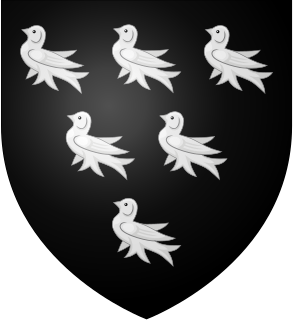
Humphrey Arundell of Helland in Cornwall, was the leader of Cornish forces in the Prayer Book Rebellion early in the reign of King Edward VI. He was executed at Tyburn, London after the rebellion had been defeated.
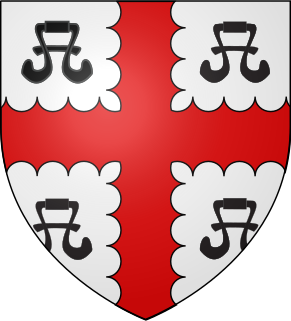
Sir John Bourchier, 2nd Earl of Bath, PC was an Earl in the peerage of England. He also succeeded to the titles of 12th Baron FitzWarin, Baron Daubeney and 4th Count of Eu.

Brixton is a village, parish and former manor situated near Plymouth in Devon, England. It is located on the A379 Plymouth to Kingsbridge road and is about 6 miles (9.7 km) from Plymouth. Its population is 1207.
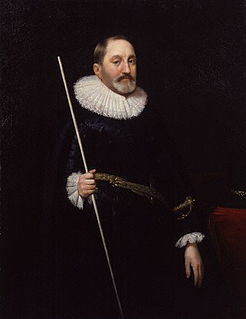
Sir Thomas Edmonds was an English diplomat and politician who served under three successive monarchs, Queen Elizabeth I, Kings James I and Charles I, and occupied the office of Treasurer of the Royal Household from 1618 to 1639.

Sir John Arundell, of Trerice in Cornwall, was a Member of Parliament for Mitchell, Cornwall, in 1555 and 1558, and was High Sheriff of Cornwall in 1573–1574.
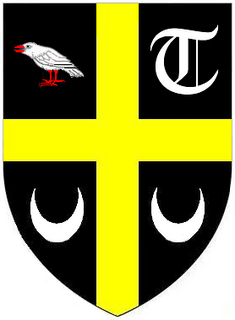
John Rashleigh II of Menabilly, near Fowey in Cornwall, was an English merchant and was MP for Fowey in 1588 and 1597, and was High Sheriff of Cornwall in 1608. He was the builder of the first mansion house on the family estate at Menabilly, near Fowey, Cornwall, thenceforth the seat of the family until the present day. Many generations later the Rashleigh family of Menabilly in the Return of Owners of Land, 1873 was listed as the largest landowner in Cornwall with an estate of 30,156 acres (122.04 km2) or 3.97% of the total area of Cornwall.

Sir Richard Edgcumbe of Cotehele in the parish of Calstock in Cornwall, was an English courtier and Member of Parliament.

Sir Thomas Wise, KB, of Sydenham in the parish of Marystow and of Mount Wise in the parish of Stoke Damerel in Devon, was Sheriff of Devon in 1612 and in 1621 served as a member of parliament for Bere Alston in Devon.

Thomas Westcote of Raddon in the parish of Shobrooke in Devon, was an English historian and topographer of Devon.

Oliver Whiddon was Archdeacon of Totnes between 1568 and 1580.

Sir Reginald Mohun, 1st Baronet of Boconnoc in Cornwall, was a prominent member of the gentry of Cornwall and an MP.
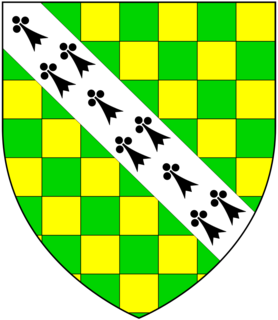
John Sparke of The Friary, in the parish of St Jude, Plymouth, Devon, was an English politician who sat in the House of Commons from 1628 to 1629.
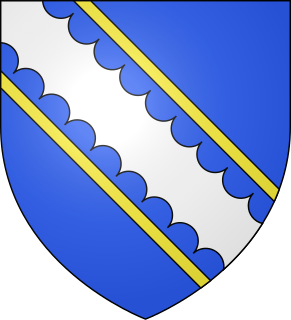
Edmund Fortescue (1560–1624) of Fallapit in the parish of East Allington, Devon, was an English Member of Parliament.
Lieutenant-Colonel John Lambrick Vivian (1830–1896), Inspector of Militia and Her Majesty's Superintendent of Police and Police Magistrate for St Kitts, West Indies, was an English genealogist and historian. He edited editions of the Heraldic Visitations of Devon and of Cornwall, standard reference works for historians of these two counties. Both contain an extensive pedigree of the Vivian family of Devon and Cornwall, produced largely by his own researches.

Thomas Peyton (1418–1484) of Isleham, Cambridgeshire, was twice Sheriff of Cambridgeshire and Huntingdonshire, in 1443 and 1453. He rebuilt the church of St Andrew's in Isleham, in the chancel of which survives his monumental brass. He is depicted in a 1485 stained glass window in Long Melford Church, Suffolk, where he displays on his surcoat the Peyton arms: Sable, a cross engrailed or a mullet in the first quarter argent.

John Fortescue, of Shepham in the parish of Modbury in Devon, was an English landowner and administrator. He is said in most ancient sources to have been appointed in 1422 by King Henry V as Captain of the captured Castle of Meaux, 25 miles (40 km) north-east of Paris, following the Siege of Meaux during the Hundred Years' War, although this appointment is questioned by Ives (2005).

John Fownes (1661-1731) of Kittery Court in the parish of Kingswear and of Nethway in the parish of Brixham, both in Devon, was a British landowner and politician who sat in the House of Commons from 1714 to 1715.

John Reynell was a Member of Parliament for Devon in 1427/28.
















